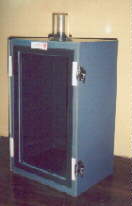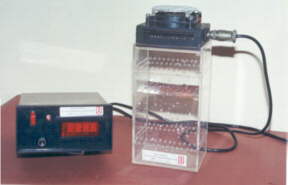The facilities of the centre have been extensively used by the Researchers of School of Life Sciences, Centre of Bio-Technology and Genetic Engineering Unit and the Centre for Plant and Molecular Biology. Over past several years the USIC developed many innovative instruments for the existing scientific equipment for life sciences research some of them are.
* Electrophoresis apparatuses
* Gel casting combs
* Electrophoresis power supplies
* Laminar flow benches
* Animal/Plant sample holders
* Pre-amplifiers, Digital pico-voltmeter
* Irradiationchambers (Optical/Laser/X-rays/Gamma rays)
* Temperature controlled baths and cryostats
* Radiation Detector
* Feed through manipulators
and hundred of such devices........



Clean Air Work Bench Sonicator Box Photo-biology Irradiation Chamber
The cost of these devices/items may vary as per specifications or due to
change in cost of raw material.